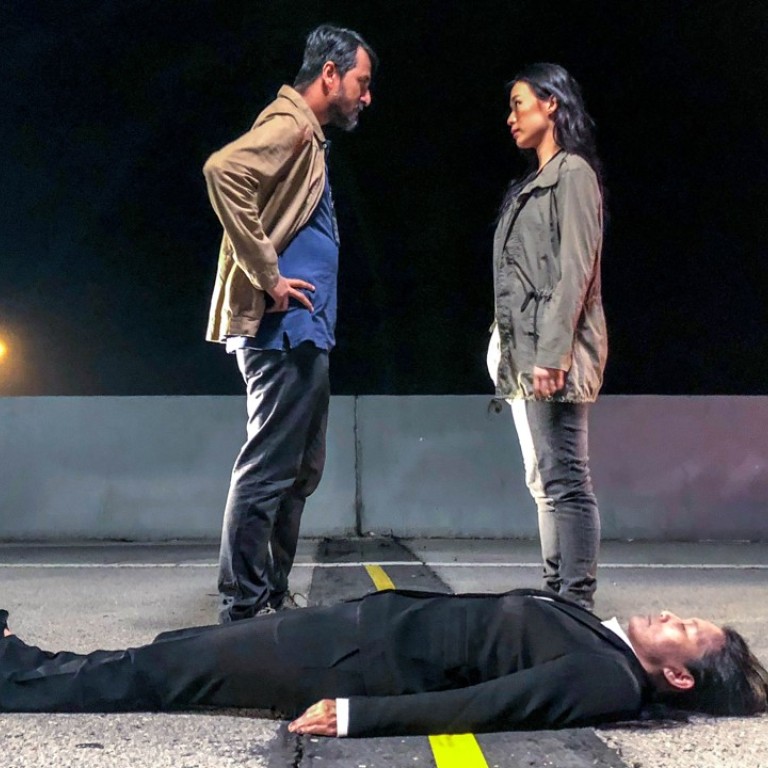
Asian remake of popular Scandinavian noir The Bridge: lack of chemistry leads to troubled waters for the seen-before show
Produced by HBO Asia and Viu, The Bridge unites a Malaysian and Singaporean crime-fighting duo as they attempt to solve the mystery of the body left on the Tuas Bridge, but the results don’t look promising
Late night: a body is found on a bridge. The victim has been murdered, it seems. The bridge is part of an international highway and links two countries, and the body has been placed at the centre of the bridge, straddling the border … but wait! As the victim is being removed the body turns out to be not one, but two halves of two victims! The hunt for the killer is on and the chasing pack is led by a detective from each country, one male, one female, an odd couple with contrasting work ethics and outlooks on life, the Mulder and Scully of crime-fighting combos.
Oh, hang on … where have we heard all this before? We’ve heard it in Sweden-Denmark; the United States-Mexico; Austria-Germany; Estonia-Russia; and Britain-France, where it cunningly became The Tunnel. “It” is now the bilingual Singaporean-Malaysian version of The Bridge, well into its 10-episode run on HBO and Now TV (channel 115), with instalments released at 10pm on Mondays and Tuesdays.
Grisse: a ‘nasi goreng western’ with Tarantino-like style and violence
Bront Palarae represents Malaysia as semi-slob Detective Megat Jamil, who succeeds in endlessly annoying Singapore’s by-the-book Detective Serena Teo, uptight, work obsessed and played by Rebecca Lim. The predictable repulsion is instant – but the anticipated personal chemistry and sexual tension that are de rigueur in such partnerships couldn’t power a Christmas party popper. Perhaps they bloom in future episodes.
The financial reasons for making a cover version of a big hit may be obvious, but their artistic equivalents are harder to identify. In a time of more or less instant access to shows from around the globe, and when viewers have seen it all before – literally in this case – the aim must be to improve on previous iterations of a show. This might prove beyond the Tuas Bridge.
It’s not just that Palarae and Lim ignite on screen like a damp dishcloth, but the storylines of murder, people smuggling, dodgy land deals, money laundering, lazy journalism and everyday social iniquities are met with amateur dramatics-standard acting.
Made in conjunction with fellow video-on-demand company Viu – which cheekily bills The Bridge a “Viu original series” – this version is also missing the louring Scandinavian gloom that was so integral to the genuine original. Maybe it’s a weather thing.
And perhaps, by episode 10, there will be confirmation of earlier suspicions: that this joint venture is a bridge too far for this endless franchise.
1983 is the Netflix alt-history series you didn’t know you needed
If louring is your bag, then head over to Netflix for the eight-part first series of crime thriller 1983, set in an Orwellian Poland where it always seems to be night, or at least dark.
An alternative history of one of the most unfortunate of countries – annexed, dissected, invaded, repressed – the show stars Robert Wieckiewicz and Maciej Musial as discredited police investigator Anatol Janów and crusading law student Kajetan Skowron, respectively, in another unlikely double act. The pair discover, in 2003, a conspiracy that has kept Poland under the heel of the savage state police for 20 years, since a terrorist bombing campaign tore through its biggest cities. Now, the bad old powers that be are naturally happy to pull all sorts of violent tricks to keep the truth behind the attacks hidden.
Tossing her hat into this happy ring is the indomitable Ofelia (Michalina Olszanska), leader of a revolutionary army ready to fight for the principle of people power. Blood, torture and death are never far from proceedings, which can make for grim viewing, but unpredictability in the plot is a welcome constant.
Available now in its entirety, the first run for 1983 is disturbing, shadowy – and highly polished.

